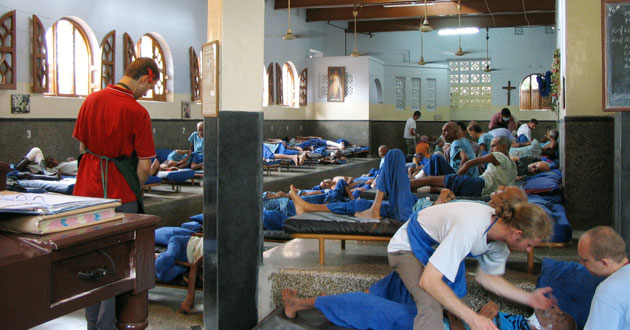Big lesson in serving small

A stethoscope can put a swagger in anyone’s walk. I don’t know if all doctors feel important when they have one around their necks, but I know that some do.
My friend Gary had his around his neck several years ago when he reported for duty at a facility run by Mother Teresa and the Sisters of Charity in Kolkata (formerly Calcutta), India.
He arrived at her place early one morning and asked where he could be the most useful to her that day. He was wearing a nice shirt, nice slacks, a sport coat, and his stethoscope. She told him he was needed at a nearby building called the House of the Dying Destitutes. This is where people go to die when they have no one to care for them. Most of the people there were dying of treatable diseases, but they didn’t have access to proper care.
Armed with his medical knowledge, maybe he would even be able to put this place out of business, he thought.
“Soon this place will have a new sign that will say ‘The House of Hope for the Living’ instead of ‘The House of the Dying Destitutes,’” he told me.
He knew he was going to make a difference. His mind began to review his medical training. This was a place that needed him.
He introduced himself to Sister Priscilla, who was in charge of the house.
“Follow me, please,” she said in her soft, British accent.
He put his stethoscope around his neck and they entered the men’s ward—a large, open room with rows of cots cradling what could only be described as skeletons with skin on them. Some were tossing in pain, too weak to fight their afflictions or even to eat.
To Gary’s surprise, they proceeded quickly through that ward and on to the next—the women’s ward. It was a similar room filled with emaciated women whose vacant eyes stared, unseeing. But again they passed through that room without stopping.
“Could there be a needier place than this?” he wondered, his mind reviewing the more serious diseases he might encounter.
They entered a primitive kitchen where a simple lunch of rice was being prepared over an open fire.
“Of course,” he thought. “They’re going to serve me lunch first.”
But they walked through the kitchen, out the back door, and into the narrow alley. Sister Priscilla pointed to a very large pile of garbage. The smell was gag-inducing.
“We need you to take this garbage down the street to the dump,” she said, handing him two buckets and a shovel. “The dump is several blocks down the street on the right. You can’t miss it.”
With a nod and a slight smile she was gone.
Recovering from a momentary stunned silence, Gary began to wonder what was happening. Didn’t they get the fact that he was a doctor?
He put his stethoscope in his pocket and attacked the pile. He filled the buckets and headed down the street. He slung the contents onto the dump and went back for the next load. By mid-afternoon he was finished. He set down the buckets and shovel and headed back through the kitchen, the women’s ward, the men’s ward—places where he thought his gifts could have been better used. He was drenched, and smelled much like the garbage heap. He was a little bothered that his talents had been wasted.
Just as he was about to say good bye to Sister Priscilla, he saw a hand-lettered sign above the door, with Mother Teresa’s words: “We can do no great things, only small things with great love.”
Gary said his heart melted when he saw that sign. All of his degrees, his certainty, his credentials, his stethoscope, maybe even his arrogance, didn’t matter.
“Mother Teresa and Sister Priscilla pierced the armor I worked so long to construct,” he told me. “Serving others is about attitude and availability to do whatever is needed—with love.”
— by Dean Nelson
Nelson directs the journalism program at Point Loma Nazarene University in San Diego. His book on seeing God in everyday life is God Hides in Plain Sight: How to See the Sacred in a Chaotic World.





